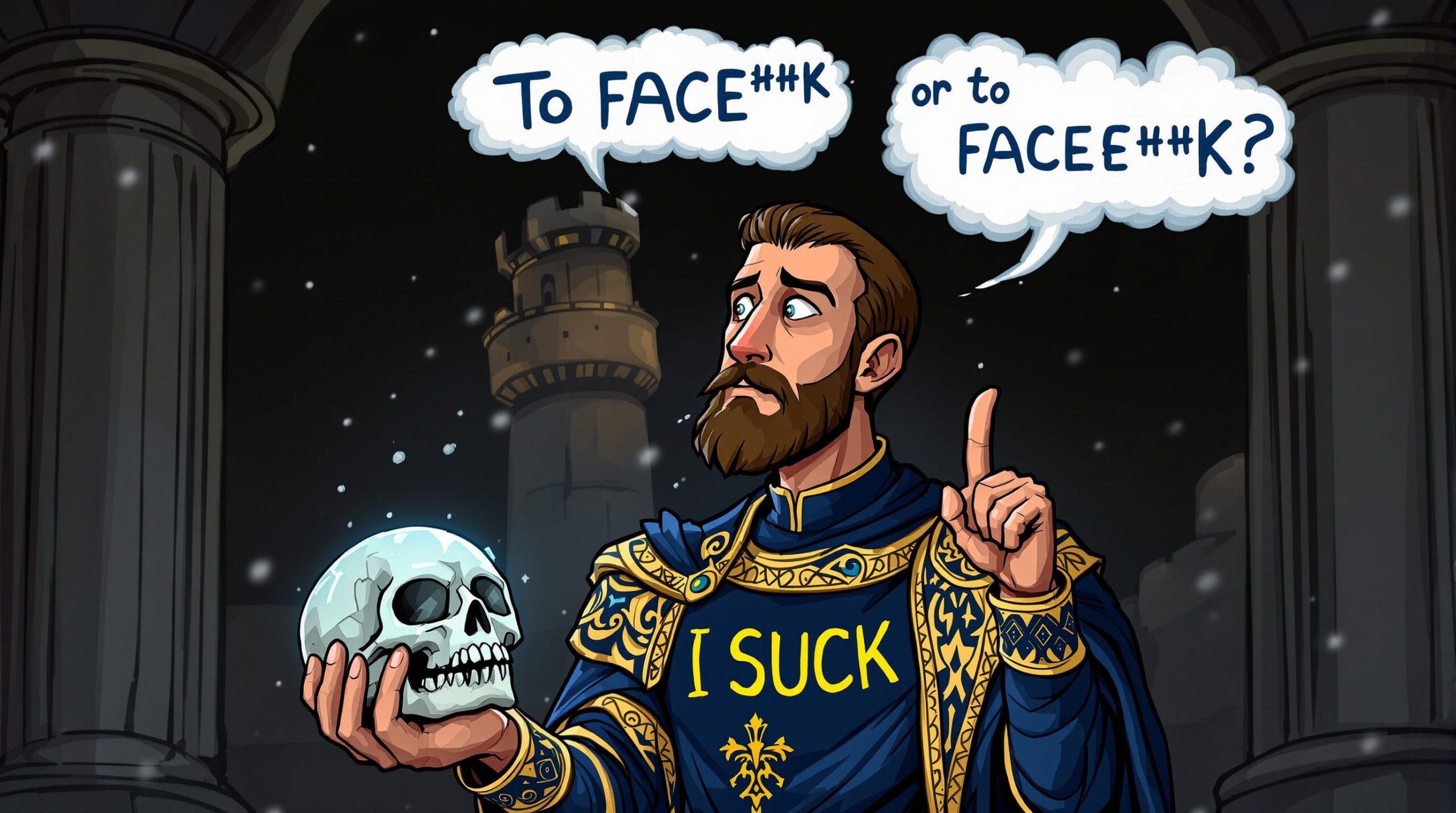"To FACE***K or FACE***K, that is the question:
Whether 'tis nobler in the mind to suffer
The slings and arrows of outrageous algorithms,
Or to take arms against a sea of trolls,
And by opposing, end them."
— Hamlet (if he had a social media account)
This story is from: Mr I Suck && I Might Be Wrong
In the grand tragedy of the internet, where timelines are cluttered with outrage, misinformation, and thirst traps, we find ourselves grappling with a question as existential as Hamlet’s soliloquy: To FACE***K or to FACE***K? Shall we continue to scroll through the chaos, or shall we rise up, reclaim our timelines, and demand something better?
This question has haunted us since 2016, when we launched the FACE***K campaign with the provocative tagline: Make Your Timeline Great Again.
It's a free service. People use it to connect. It's a free service. People use it to connect. It's a free service. People use it to ..
It was a call to arms against the tyranny of algorithms, the manipulation of truth, and the endless scroll of despair. But as Hamlet himself might warn us, the fight for meaning in a world of noise is no simple task.
Act I: The Ghost of Meaning
In Hamlet, the young prince is haunted by the ghost of his father, who demands vengeance for his untimely death. Similarly, we are haunted by the ghost of what social media once promised to be: a place for connection, community, and meaningful discourse. Instead, it has become a battleground where bots, trolls, and outrage merchants reign supreme.
When we launched FACE***K in 2016, we sought to exorcise this ghost. We wanted to strip away the layers of algorithmic manipulation and return control to the users. Make Your Timeline Great Again wasn’t just a slogan—it was a rallying cry for authenticity, for truth, for a timeline that didn’t feel like a digital dumpster fire.
But like Hamlet, we soon discovered that the enemy was not just external. The real battle was within.

Act II: The Algorithmic Madness
"Though this be madness, yet there is method in’t."
— Hamlet, Act II, Scene II
The algorithm, much like Hamlet’s feigned madness, operates with a methodical cruelty. It feeds us what we want—or, more accurately, what it thinks we want. Outrage, bias-affirming headlines, and thirst traps rise to the top, while nuance and truth are buried beneath the noise.
And yet, as the article “Facebook Isn’t the Problem; Facebook Is the Software the Problem Currently Uses” so astutely points out, the algorithm is not the root of the problem. It is merely a reflection of us. Like Hamlet staring into the skull of Yorick, we are forced to confront an uncomfortable truth: the chaos of social media is a mirror of our own desires, fears, and flaws.
Our FACE***K campaign was never about blaming the algorithm alone. It was about holding up that mirror and asking: Is this who we want to be?

Still scrolling?
Were the Mac is that Apple? Phoning home?
We love how you scroll!
Act III: The Censorship Conundrum
"Something is rotten in the state of Denmark."
— Hamlet, Act I, Scene IV
In recent years, the fight for meaning on social media has taken a darker turn. Fact-checking, once heralded as a solution to misinformation, has been replaced by “community notes”—a system that, in theory, allows users to add context to posts. But in practice, this noble idea has been hijacked by bots and bad actors, who bully the system into submission.
The result? A new kind of censorship, one that masquerades as democracy but is driven by mob rule. Instead of elevating truth, community notes are often weaponized to suppress it. The FACE***K campaign, with its call to Make Your Timeline Great Again, now finds itself battling not just algorithms but also the very tools meant to combat misinformation.
Hamlet’s struggle to discern truth from deception feels eerily relevant here. Just as he was manipulated by the schemes of others, we too are at the mercy of systems that claim to serve us but often serve their own agendas.
Act IV: The Fight for Meaning
"What a piece of work is man! How noble in reason, how infinite in faculty!"
— Hamlet, Act II, Scene II
Despite the chaos, we believe in the potential for something better. The FACE***K campaign has always been about more than just critique. It’s about action. It’s about reclaiming our timelines—not by waiting for tech giants to save us, but by taking control of our own digital experiences.
Unfollow the outrage merchants. Mute the bots. Share content that uplifts rather than enrages. And, most importantly, demand accountability—not just from platforms, but from ourselves.
Hamlet’s journey is ultimately one of self-discovery. He learns that the fight for meaning is not about external battles but about confronting the truths within. Similarly, the fight for a better internet begins with us.
Ask yourself: Do the people I surround myself with add any value to my life?
Still scrolling? Keep going!
Act V: The Epilogue
"The rest is silence."
— Hamlet, Act V, Scene II
In the end, the question of To FACE***K or to FACE***K? is not just about Facebook. It’s about the internet itself, that vast and unruly stage where we all play our parts. As the article so eloquently argues, the internet is a reflection of us. If we don’t like what we see, the change must come from within.
So let us take a page from Hamlet and confront the ghosts that haunt us. Let us fight for meaning in a world of noise. And let us remember that, in the grand tragedy of the internet, we are not merely players. We are also the authors of our own stories.
To FACE***K or to FACE***K? That is the question.

SPACELAUNCH NOW!
Get Your Site Up & Running
SpaceLaunch is an ideal choice for those seeking to swiftly establish their own website, it offers a comprehensive and user-friendly solution backed by essential features, FREE domain registration / transfer / renewal, 1h FREE technical support to get you going, and the flexibility to grow and expand as needed (add-ons available).


